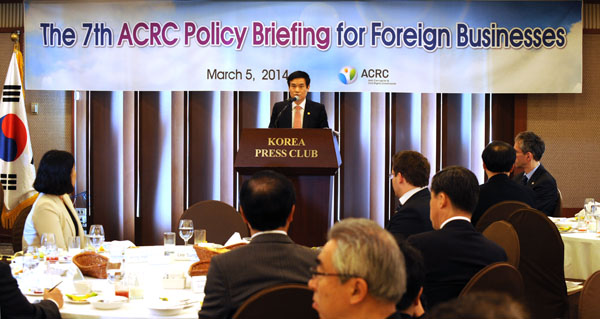News & Publications
Press Release
ACRC Chair meets with foreign businesses in Seoul
- Date2014-05-12
- Hit4,029

The ACRC hosted the policy briefing for foreign companies in Korea at the Korea Press Center in Seoul on March 5, inviting over 50 foreign business representatives. Launched in 2008, the annual policy briefing marked its 7th anniversary this year, and has provided a platform to attract the attention and enhance understanding of foreign business people on Korea's anti-corruption policies.
This year's policy briefing was attended by representatives from multinational corporations and foreign chambers of commerce in Korea, including Thilo Halter, chairman of the European Chamber of Commerce in Korea; Amy Jackson, president of the American Chamber of Commerce in Korea; and Hirotsugu Ishiyama, chairman of the Seoul Japan Club.
ACRC Chairman Lee Sungbo affirmed the strong determination of the Korean government to fight against corruption, while introducing the government’s major anti-corruption policies and plans for this year to make Korea a cleaner country. He also listened to the difficulties of foreign business people in their business activities and daily lives.
Chairman Lee explained in detail the background and purpose of a bill on the prevention of illegal solicitation and conflict of interest of public officials, submitted to the National Assembly last year. He promised that the ACRC would do its best for the bill to be passed at the National Assembly. At the briefing, Korea’s major anti-corruption systems were also introduced, including the asset declaration system and the blind trust system for public officials, the internationally acclaimed Korea On-Line E-Procurement System, and regulatory reform measures designed to prevent corruption risks and improve government transparency.
The suggestions made by the participants during the meeting included enforcement of laws and regulations without discrimination against foreign businesses, and establishment of a guideline to prevent corruption committed covertly in the form of bilateral contracts between medical professionals in national and public medical institutions and pharmaceutical companies.
The ACRC is planning to follow up the proposals and difficulties raised at this session and to keep communicating with foreign businesses to support their investment and business activities.









